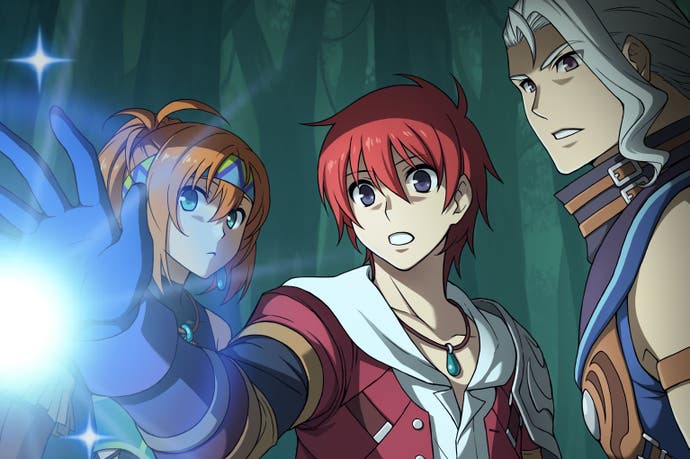Ys: Memories of Celceta review
That's pronounced 'eece', adventurer.
On the back of a recent betrothal to Sony handhelds, Falcom has already released definitive revisions of the first three Ys titles for PlayStation Portable. Thanks to US publisher XSEED's truffle-sniffing for the best of Japan's overlooked works, the action-RPG series is now party to a growing international fan base.
Back in 1993, Ys 4 was licensed to two external 16-bit developers, a debacle that resulted in two very different variations of the same game. With Falcom in the process of rewriting the series canon, this Ys 4 remake - now dubbed Memories of Celceta - is the company's first title for PS Vita.
Protagonist Adol Christin is a rogue adventurer of Sinbad ilk, but younger, cleaner, and all licked in anime, a seafarer in search of lands to liberate from evil and girls to make weak at the knees. In Memories of Celceta, he finds himself in Casnan's town bar suffering complete memory loss. Normally one would assume this to be the result of one too many gin and tonics, but it turns out that he was exploring Celceta's Great Forest: a vast, uncharted area whose labyrinthine nature is known to imprison the meek.
Although events occur chronologically after Ys 2, there's only scant reference to the flame-haired Adol's former exploits in Esteria, following the series' tradition of bespoke adventures with no explicit ties to each other. It's also markedly different from the original incarnations of Ys 4, opting to cherry-pick plot components and make certain characters playable for the first time.
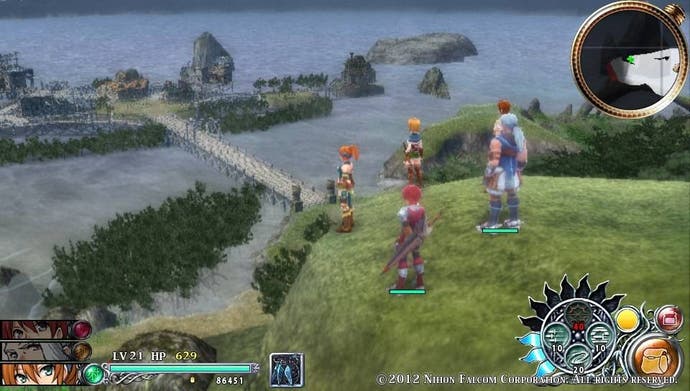
Celceta is visually charismatic and splendidly glossy. The automated camera is nicely optimised, panning and scaling to reveal the breadth of quaint townships, arcane architecture, and picturesque vistas in the forest's inner sanctum. Character portraits are sharp and plentiful, and it's graphically well defined.
Using a Vaseline filter to soften rough edges, the game bears a passing similarity to Squaresoft's PS2 beat-'em-up hybrid, The Bouncer - another game with a redheaded hero. This touch of bloom is far from an issue though. It may not make the hardware sing new wonders, but it looks - and sounds, thanks to the work of Falcom's dedicated sound team - plenty colourful.
Adol is first accompanied by Duren, a do-gooder helping him salvage his memories in return for a little coin, before eventually working up to a six-strong team. Only three characters can be present on the battlefield at once, each equipped with different attack repertoires and unique actions. You swap between those who pick locks, smash fissures, and deal better with certain types of enemy, their expertise denoted by Slash, Pierce and Strike suffixes. When you have more than three members at your disposal, assessing an enemy's weakness and tactically arranging your team by ability results in increased damage output.
It's an enjoyable and intuitive system that becomes more involving when navigating dungeons and monster-entrenched areas. Combat and boss patterns are more mashy than say, Ys: The Oath in Felghana, but Celceta's handling is still smooth, speedy and engaging, inheriting the engine and combat fundamentals from 2009's Ys Seven.
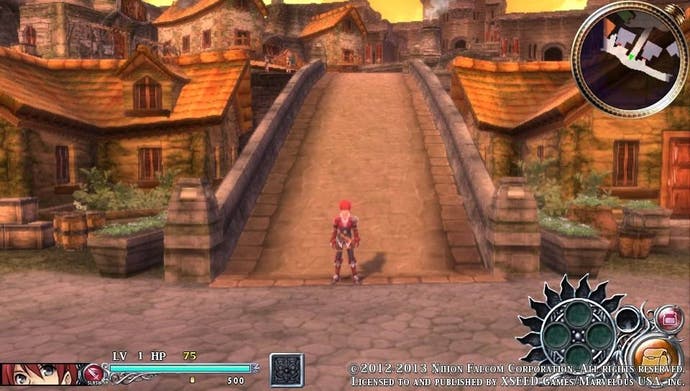
In addition to standard attacks, each character can assign up to four special battle skills that generate Skill Points and HP bonuses when delivered as a finishing blow. Levelling up with use, some engage aerial juggling, freeze enemies, or increase the defence properties of the team. In terms of power, they're secondary only to your EXTRA Skill, an ostentatious once-in-a-while devastator governed by a treacle-slow gauge.
Although initially falling foul of unexciting button repetition and only switching team members when absolutely required, you're given more reason to experiment with team layouts and combos at around 13 hours in. Unless you want to rely on affordable life potions - a mundane and unrewarding way to bypass any need for technique - it pays to get technical with Flash Guard and Flash Dodge: highly satisfying last-second evasions that leave enemies prone to powered-up counter-strikes.
Where Final Fantasy is akin to an RPG Gran Turismo, happy to lump the player with a million turn-based trinkets to tweak and prearrange in the name of longevity, Ys' legacy is channelled through reflex-based action, inventive dungeon layouts, and heavy-duty boss encounters. By proffering progression-based bonuses over retrofitted shopping sprees and inventory maintenance, its structure is often compared to Nintendo's Zelda.
Celceta does well to preserve these principles while evolving in line with modern design conventions. For the first two hours you'd be forgiven for thinking you'd purchased a dungeon crawler, with Adol and Co. charting the Great Forest in the name of cash money and memory reclamation. With navigational pins and teleportation waypoints aiding your map management, it drifts from the series' usual arcade tack to involve more legwork, percentage fulfilment, and abundant material farming; iron ore, gemstones, and a bevy of monster appendages improve your wallet and armoury through a process of refinement.
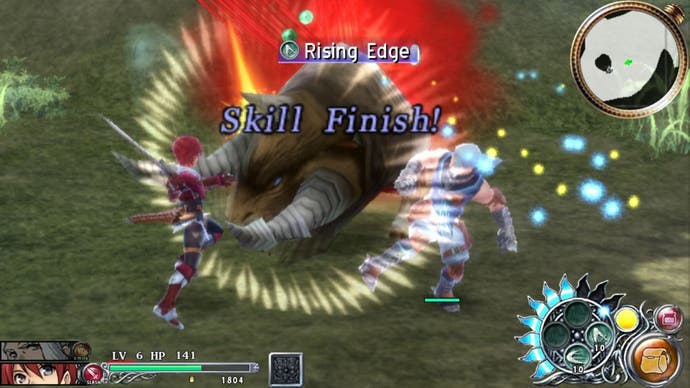
Balled around a classic framework of linear, combat-based adventuring and friendly 1980s RPG methodology, these augmentations will be obvious to long-term fans. But while side-questing, item-exchanging, and the overarching mapping pretense are all there to expand Celceta's play time, it's contoured by an old-school awareness that lets you mine its depths or skim its surfaces as you like.
The Great Forest is an attractive space full of amiable inhabitants, lively villains and finely crafted gauntlets. Like a jaunt through a Japanese approximation of Tolkien's Mirkwood, its clearings and extremities host ancient lands and Ewok-style villages hidden from the outside world.
The curiously insubstantial plot takes larger shape after several hours; Adol's retraced footsteps are more distinct and intriguing with each new revelation, and your relationship with the game changes gear when you realise all the periphery is ultimately lightweight and unburdening. While you're naturally compelled to pound every rock fount into coal-spitting rubble and seek out loot while en-route to new destinations, scanning menus is a largely secondary activity. After an initial breaking-in period, and by the time you obtain the Golden Wing - an artefact that allows you to warp freely about the map - it feels just like old times.
Although online multiplayer was a bridge too far for Falcom's coders, Celceta is a beautifully honed single-player experience, upholding the series' creative traits while adding a catalogue of new ones. As if in a Monster Hunter lite, larger forest-dwelling beasts whom you had to flee from early on become targets for EXP gain when your levels increase. You also find new uses for character swapping: Karna's knives chipping away at distance, Ozma's spear with an advantage in water, and Frieda's sizeable Halberd having a range benefit when encircled. A practical use of the Vita hardware lets you shift your party into offensive and defensive patterns with a dual finger swipe on the back panel, while a thumb tap on an enemy reveals its weaknesses.
"Though a few tweaks short of masterful, it's a pleasure to find Ys in such good standing"
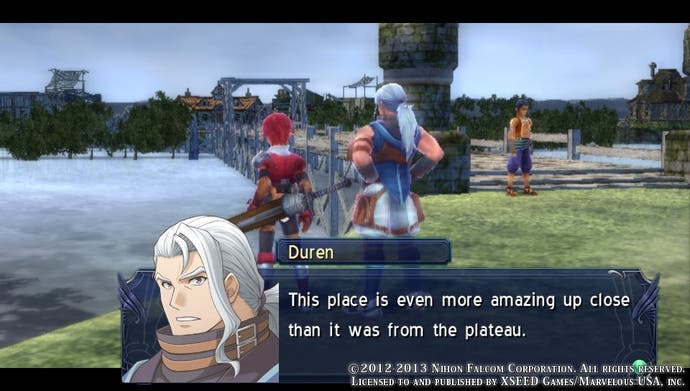
The series' staple magic tools remain a vital fun-factor ingredient, including bracelets that shrink you to dwarf size and boots that let you sprint up walls at supersonic speed. They don't often have any exceptional use beyond immediate and obvious barriers, but then, like an arcade game locked in a role-playing universe, Ys' linearity has always been crucial to its success.
Bar one or two muzacky J-Rock exceptions, the soundtrack is exceptionally high grade: graceful compositions capturing the sunlit mystery of the forest's groves, scores of dread and thunder footnoting the Sanctuary of Storms, and revved-up boss fracas.
The achievement of an overworld that shrewdly disguises its mechanical purpose as a sprawling organic domain - a fusion of spirited towns and ruined capitals hemmed into the Great Forest's troughs and furrows - is only slightly sullied by the default setting's lack of challenge, and a disappointing scarcity of legitimate dungeons. Kicking the difficulty up to Hard or Nightmare is more rewarding, making Flash Dodging a necessary art and introducing new boss attacks to tussle with.
The plot's fractured delivery may be more intelligent than the underlying script, but its thickening is neatly paced, with titillating twists piquing your interest before it ever has a chance to flag. The dialogue occasionally ambles, with humdrum compensations for Adol's muteness, and the finale could have had a stronger pay-off, but the extensive cast's various personalities are deftly rounded and there's a respectable level of fourth-wall humour to keep things light.
Though a few tweaks short of masterful, it's a pleasure to find Ys in such good standing - proof of Falcom's ability to transpose 25 years of blueprint into an up-to-date, three-dimensional trapping. Sporting a level of adaptation that appeals to both loyal fans and those who require something beyond blistering combat, this remake is content-rich without ever being overwhelming: a grand adventure, sanded down to maintain impressive momentum.
In respecting its heritage, Falcom has inadvertently become a boutique RPG developer in a genre often stifled by assembly-line production. If you were spoiled for choice, Memories of Celceta would still be one of the Vita's best titles.
